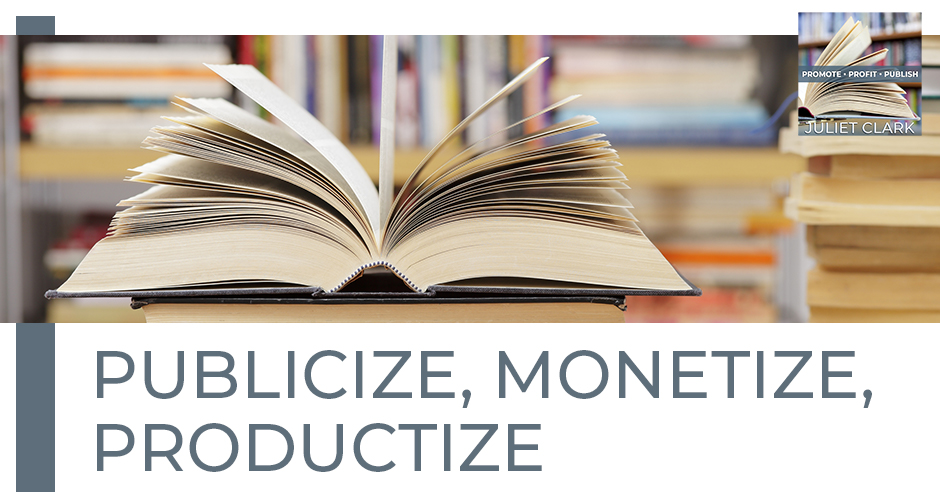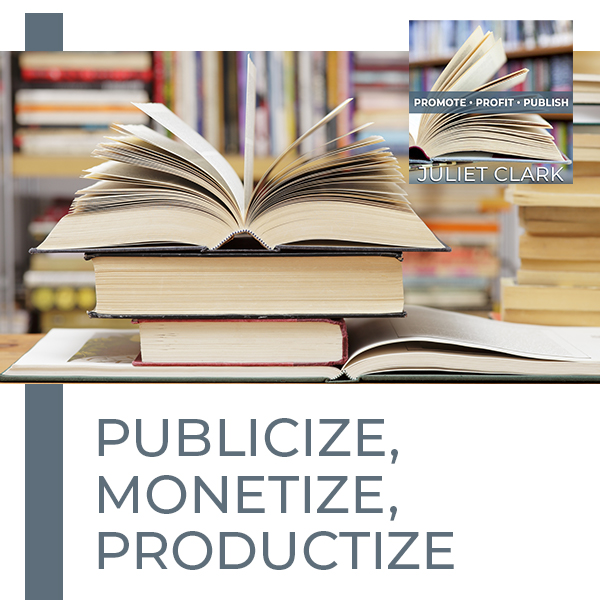
How do you create revenue streams from the book you just created? It’s not exactly rocket science but it helps to have a few tips and tricks up your sleeve. In this episode, Juliet Clark interviews award-winning creative entrepreneur and founder of The Author’s Leverage Parchelle Tashi about how to publicize, monetize, and productize your book. Parchelle’s personal mission as a teacher is to create note noteworthy learning experiences that inspire action and change. She helps authors monetize their work by creating , impactful online courses for authors and creators who want to establish revenue streams in their businesses. Tune in and learn how you, too, can earn real money from your brainchild!
—
Watch the episode here
Listen to the podcast here
Publicize, Monetize, Productize With Parchelle Tashi, Founder Of The Author’s Leverage
We have a fun guest for this episode. I met her before and loved what she was doing but more than anything, I love the quality of her work. It’s incredible. Before we get started, I want to remind you we have some new products out in 2023. If you are thinking about exploring what the publishing world is all about and what you have to put together to successfully launch a book, we have a new course. It’s probably about 90 minutes, maybe even a little bit less. It’s called Prep Your Expert Book. You can find it at PrepYourExpertBook.com for $47, so very affordable.
We want people to understand what they’re getting into because it’s not just about writing your book. There’s a lot there that you need to know. A lot of work may have a very steep learning curve in order to launch successfully. We also have another new course called Build Your Author Avatar, and you can find that at www.BuildYourAuthorAvatar.com. That is about building your ideal reader from the ground up and understanding the information you have to pull together for great market research. Your book starts with that market research. If you write a book for everyone, you’re going to reach no one, so it’s very important.
Also, the free stuff, Breakthrough Author Magazine. We have some new contributors. It’s www.BreakthroughAuthorMagazine.com. It’s a free subscription. You’ll get the magazine dropped into your inbox on the first of every month. As I said, we’ve added some exciting new contributors, like Jackie Jordan. I saw her mentioned on Tucker Carlson. I’m proud of her for getting one of her clients booked on Fox Nation. Also, Tracy Hazzard starts in February. She is the CEO and owns the Podetize company, which is the largest post-production podcast company in the world. A great place to learn from her about guesting and all sorts of things that are podcast-related.
Nina Froriep and Robin are video experts. Video is 85% of what’s on the internet these days. It’s what people consume on a regular basis. Important that you understand how to use it but also get comfortable using it. That’s what Robin and Nina are super great at. Nina was a big producer in New York, as was Jackie too. I should ask them if they know each other sometime.
Our guest is Parchelle Tashi. She’s an Award-Winning Creative Entrepreneur, popular podcast host and creator of the Author’s Leverage, and a former high school math teacher turned techpreneur. She’s an education design architect and video producer with a Master’s in Curriculum Instruction from Virginia Tech. Parchelle lives and works in San Diego, where she spends her time brainstorming ways to help other creatives get more bang for their books. She and her team specialize in creating high-end, memorable, impactful online courses for authors and creators who want to establish revenue streams in their businesses.
At heart, Parchelle’s personal mission as a teacher is to create noteworthy learning experiences that inspire action and change. One of the things that impressed me the most about Parchelle was being on her podcast, The Author’s Leverage. The professionalism of her intros and outros was truly amazing that we hired her to create our new intro as well. Stay tuned for the interview with Parchelle.
—
Parchelle, welcome. I’m super excited to talk to you. It seems like I have talked to you every week lately.
I know. That is the case. It’s like, “I get to talk to Juliet again.” Thanks for having me.
You’re so welcome. Parchelle, tell us a little bit about how you got from teaching school to helping authors turn their books into courses.
It’s such a good story. I’m a former school teacher. While I was teaching, someone asked me about making a video for their business. Up until that point, I was making videos for fun, for community groups and for the churches I was a part of. When someone asked me, “How much would you charge?” I thought, “This is a great opportunity. I could make some extra money as a teacher.” My world into entrepreneurship went down the path of video production.
I was trained as a video as well through this process. I started with doing camera work for small businesses locally in Virginia to running a multisite production company where I was the main producer at the runner of this company. To fast forward, I did that for about ten years in video production and essentially got to a point during the pandemic, I think most of us did, where it was like, “What is next? What else is there for me to explore when it comes to my passions and the things that I’m into, having more of a fulfilling life as a business owner and as a human?” Essentially, I had the opportunity. There was an author who, here locally in San Diego, wanted to turn her book into a course. I thought, “Let’s take it on.” Her main concern was getting the production done and getting it done at a certain quality, which is why we were reached out to for that.
In that process of producing the content with her, with my team, on-site and also helping support the strategy of this course, it was like, “There’s a lot here that we can support other authors in,” because I’m an avid reader. I love to read and learn. Being a teacher myself, this was something that I felt would be an amazing contribution when you ask the question of, “What is my highest contribution to other people?” It is for me through education, media and connecting with people interested in learning and creating that relationship. That’s been fun from a general sense. That’s how I got into this space. Since then, I was like, “Let’s create an offer, something of value for this niche of authors.” It’s been exciting thus far.
What excites me about having another teacher that we’re working with is Chris Johnson, our book developer is also a former teacher. You guys pick up that piece where I don’t have the patience, and you folks work with kids all the time. Do you ever work with middle school kids?
That’s what I did my student teaching in, and I said, “That’s not my group.” I was more comfortable with the older ones, so high school and teenagers more of my range. Middle school or elementary is not for me.
Any of you out there that are parents will know that those junior high years are as unpleasant as they are at home. Imagine that these teachers have to spend all day with your kids.
I’ve got stories, that’s for sure.
I bet. Think from the middle school teachers I know, no offense to you folks, but I pretty much know that you all drank. I have compassion for that because you deserve to.
It’s not an easy job.
Even parenting kids that age is not. You got into building courses and decided to do this with books. Our biggest challenge when we work with authors is helping them understand that you will not make the bulk of your money from your books. The cost of paper is continually going up, which means the wholesale price of the book is going up. You probably are looking over on Amazon and seeing because of that, the retail price is going up. As an author, you have to have those next steps in place and use that book as nurture. How do you take that and break it apart into modules? You mentioned to me when we got on that you have a new product called Book to Shorts. Explain what that is because I’m going to take an old book I wrote.
This sounds like a lot of fun. I’ve not done this before on a show, so I’m interested to see how it goes. When we’re taking apart a book, we’re looking at it from different perspectives. One is looking from a marketing perspective. Whatever we’re creating as a product is something that we want to create value in exchange for, whether it is an email or for someone paying dollars for it. We want to look at its marketability of it. With that, we’re making sure that we know who your audience is, who this is for, what they care about, what their interests are and how they prefer to learn. We’re diving into understanding the landscape of how this reader thinks and learns.
As a teacher, when I took my courses on how to create courses, talk about the three different learning modalities you have to get in there, so people understand being a visual learner.
There’s a visual, auditory and kinesthetic where either someone’s going to learn well. They can do fine with visually seeing things. I’m a very big visual learner. You also have some that don’t need visuals. Audio, which is popular now with audiobooks and other ways that we consume content, where you can do other things while you’re listening, is another learning form. Kinesthetic means, when it comes to the actions of things, it’s how you are essentially creating your lessons to get them into some action. Sometimes engaging other senses are important.
They go from using their eyes and ears to now using their eyes and ears. Maybe something you’ve sent in the mail as a companion to how they’re learning or going about that, or maybe there’s an actual prop they need to use to complete that exercise. There are different levels that engage them, and it’s about the senses, how they’re engaged in different ways, and what the preference is for that learner.

The Author’s Leverage: There are different levels that really engage learners. It’s really just about senses. The senses and how they’re engaged in different ways and what the preference is for them.
Kinesthetic is learned by doing in-person. That’s more what I am. You can throw jargon at me, but at the end of the day, if I don’t have my hands in it and doing it, it’s not getting done. I remember trying to learn how to use an excel spreadsheet. I was like, “Math.”
There are some things you have to get in, get your hands into, learn it, and be effective. The courses and the things that we take in that take deeper root is when we’re encouraged and it’s fun to take action, jump in, and do the work.
I wanted my audience to know that because I know a lot of times, the average person will sit down and create something then they don’t know why it’s not engaging. The reason it’s not is because you didn’t. Without that skill of learning to be a teacher, you have to incorporate all that in to keep people engaged. I’m done interrupting you, I promise.
The other aspect we look at when developing courses or anything we’re doing with the author and breaking the book apart is identifying the business ecosystem for the author themselves. What do you currently have running now to support your business? What are your offers? How does this course, product, or book fit in line with this ecosystem that you currently have?
That’s another aspect that we look at. That way, the course or whatever product is being developed from your book is something that is supporting what you currently have going with your marketing and sales. Perhaps your book is helping you to get on stages or get in with one-to-one coaching opportunities, and that’s great. A lot of authors that I’ve talked to are wanting to clear their schedule a little bit because they’re stuck with so many one-to-ones. Now with a course, you have something in the middle, and you can essentially increase the pricing of your one-to-one because now you have the solution in place.
We also look at the business ecosystem when we’re looking at the book, which I know is outside the book, but that’s a part of the process as well. Lastly, more into what you’re saying about how we take apart the book. The table of contents is important, but we don’t want to always use that as the basis for what becomes the course. Sometimes that’s a good fit, and sometimes it is not because you want to answer a few questions in that process.
One of them being, after my reader has read this book, what is their next challenge that a course can address or some other product? Maybe after reviewing the book, we see that there’s a popular or a meatier chapter that someone needs to get more in action with. Having a course to address that need is an option that we are looking at.
We also look at, in general, how we get them into action and reading your book to create a faster process and journey for them to get the results they’re looking for more quickly. They picked up the book for a reason. There’s something that they want from it but let’s be honest, a lot of these tactics and things that we get, they’re nothing unless we get into the action with them.
That’s where a course also comes in to support that need of all of us. How many courses have you bought and didn’t finish, or how many books do you have that you’ve not completed or said that you know the fullness of it in your life in whatever arena you’re trying to apply it? Those are the aspects we look at across the board when it comes to taking apart a book. It’s not just about the book itself but also about the reader and the author.
I mentioned to Parchelle before we got on that we have a literary that asked us to create a higher-end course, so we’re in the process of it. I have a module on service versus selling. It’s part of the first module where we get everything in order. I was throwing things away, and my book popped out that I had read, The Art of Serving, Not Selling. If you were going to take this book and break it down, should we start with the table of contents?
Because we’re on the fly with this, the first thing I would start off with is, what is the overall premise of the book? What is the reader going to get as an end result from reading the book?
Be able to listen and validate their ideas, then they build the avatar, the emotional connection, and it talks a little bit about ethical enrollment. When they’re all said and done, their avatar should be built. The reason I titled it Pitchslapped is because I was tired of going into rooms where you do a 90-second pitch or something but even bigger going to networking meetings. All of a sudden, Parchelle walks up and starts telling me about trying to pitch me courses, and I have no relationship to that. It’s all about building trust and being of service before you sell. By the way, if you all haven’t bought this, it’s a few years old.
Build trust before you sell. Be of service before you sell. Share on XI love it. That sounds great. Essentially, after reading the book, someone’s going to know who their avatar is. They’re going to know how to effectively build that trust before they jump into selling something.
It’s more about finding your ideal market. I tell them how. We don’t build it in the book, but I start telling them how, the buzzwords to listen when they get on the phone to start talking to people, start writing down those words that people say to them over and over the pain points, then starting to validate via content, via quizzes, via lead magnets and start providing value. It’s about starting to provide that value and listening, “Is this the value they’re looking for?” validating, and then moving on to different things. It’s probably much the same that you would do before you created a course.
For sure. Tell me also because that makes a lot of sense. In what way is this going to help your reader? I hear what you’re saying. They’re going to know their avatar and build this trust before they sell. It’s going to support them in networking. Overall it’s going to help them grow their business, but to do it, it sounds like a more natural way.
I would say more natural and more intentional because one of the reasons I wrote it was that I had so many coaches, authors, and speakers I spoke to, wanted to capture everybody. You need to niche down and find your people. You’re casting a net, maybe not a wider net but a more narrow net to the right people.
How would you describe your ideal reader?
My ideal reader is probably either somebody who’s brand new to online marketing and author platform building. I mainly did this for author platform building. Also, maybe that person who has been in business and it’s in a hobby until now or they’ve been casting a net and failing. Many coaches fail because they don’t get this marketing piece right. Probably those would be my primary, secondary and tertiary audiences.
Perfect. That is beautiful. To give context to our readers, this is part of the process, asking questions, and from that, I’ll tell you how it can be best constructed as a product, as a course and what we can do with it. Let’s have a couple of other questions because I’m trying to speed through this to get to the essentials. Can you tell me a little bit more about the book itself? How long is it? How many chapters? Let’s take a look at that.
This is ten chapters. I usually don’t write a book over ten chapters because people can’t handle more than that, and I kept it very concise. It’s 76 pages.
For you, as the author, how does this support? What are your envisions for how this book can best be utilized to support you as the author?
As the author, these are the basics. When you show up for publishing, I’m going to ask you a lot of these questions. I want you to have the answers. Even bigger, it supports authors in a way that their book isn’t haphazard. Do your research. Probably the biggest thing I’ve seen coming from advertising is the small coaching industry, the authors, and all of that doesn’t do an adequate amount of market research. That’s why I think they fail. We all know, Parchelle, that marketing is a guess, so take that guess and validate it before you start building.
What about for you and your business? You’ve put a lot into that book, and you have it. It’s printed in your hand. You picked it up and found it. Tell me, how does this book support you? Look at your overall business.
The funny thing about this was I did this from a course. I did it backward. This was something I taught back in 2017, 2018 and 2019. I dropped my courses in 2020 because, quite frankly, we were running them six-month courses, and I was sick of hearing myself talk. I bet teachers do that all the time. We stopped courses in 2020, but now I’m starting them again in 2023.
That’s amazing. You’re already looking to revamp that in a sense to get some people some valuable walkaways with that information, so that’s perfect. Those are some of my main questions. I usually ask a little bit more, a full-out session that I do with someone. Essentially, what I have here is an understanding that these are newbie authors or newbie business owners who have a hobby, perhaps, but they are new to building an online marketing strategy, having that going to support their platform building at that stage. They are new. The end result is for them to know who their avatar is and to know how to essentially build that trust before going right into selling things.

The Author’s Leverage: Newbie authors or newbie business owners are new to building an online marketing strategy and support their platform building at that stage. So they need to know who their avatar is and how to essentially build that trust before going right into selling things.
They will be going to be more comfortable and more confident in networking scenarios. They’re going to be more confident in meetings and what they’re doing in general in their business. To understand the chapters of your book, you have ten chapters. It’s a quick read, and it sounds like it’s action-packed because it came from a course. That’s what I’m hearing as well. It’s already got those actions in there. My last question is going to be, is there a particular chapter or area that is more difficult for the readers to implement or is there a place where you feel like they get the most stuck?
It’s by overcoming the click mentality. The reason that I have overcoming the click mentality is because of high-end courses. There are a couple of things going on here. Number one, this book, you should feel more comfortable selling if you follow this because you’re talking to the right people all the time. A lot of times, when you follow this, you don’t have to do a hardcore sell because people already trust you when you’re talking to them.
When I talked to you, I listened to what you said to me about the courses. I immediately trusted you. We started doing things almost immediately together because I was like, “This girl knows her stuff. I like her, and I trust her.” That’s why people hire you. That’s the first thing about this. Overcoming the click mentality, we’ve all been taught throughout online marketing that we need to build these big funnels.
You look at ClickFunnels and all of these things. Those funnels are not what sells. I want authors to get active in relationship building. Getting the right amount of funnel clicks and moving them into relationship building is the only way you’re going to get from that smaller into that larger. You know this from being in this business. A lot of influencers out there are like, “It’s easy. Give me $3,500,” and people pay $3,500. That’s a lot of money. You have to build that confidence in advance. That’s what I’m hoping that book brings across to people. This is not an overnight thing. You’re not going to be 6 figures in 6 months. Be realistic. This is a business. It’s sustainable among the scales.
That’s powerful. I love that you have that in there because there is a shift there. I can see why that would be difficult to go from this click mentality being focused on that to now being focused more on the relationships because there has to be a good balance between the two. We still need the clicks, but we also need to have good relationships also.
Also, going back and tooling and retooling until you get that balance right. I know you build funnels as we do too. It rarely happens that we build a funnel and you’re in an overnight success. Usually, we have to go back and look at, “What is the disconnect? Where are people dropping off? Do we need to retool some things too?”
This is powerful. I need to get this book.
I don’t know how good it is.
After they’ve finished the book and gone through this process, what is next for them in working with you? If we consider that this is a stop along the journey of the Juliet Clark world, what is it that is offered for the next or is a good next step for them in your entire offer suite? I know you offer different things. What is the ideal next step for them?
They would be moving into our courses. One of the things here is you can read a book like this, and it seems, “I can do this,” but then we were talking about before we jumped on here, author platform building has a steep learning curve. The next steps would be, “What is it in this book that I need help with? Maybe I need to contact and either get some one-on-one coaching to help us build or take some of those courses.”
We have a suite of courses from $47 all the way up to $2,500, $47 one time, and $97 one time. Now we have a course that’s one month $1,497 and another that is $2,500 a month for six months, and we do an entire build. It’s moving into those suites of products that you need, which is hopefully what everybody comes to you and says about a book.
This is perfect. I’ll go ahead and sum up the way what we would do with your book. Typically, authors are at a stage with their book where based on sales, based on what they’re seeing in the market, and what they’re seeing they wish they could have done, but maybe they’re limited in some areas, they’re looking to focus on 1 of 3 areas, either to publicize your book, meaning to make it known to the public a little bit more or to monetize it. We talked a little bit about funnels. It’s a way to easily create upsells and opportunities and an ecosystem to follow up with those people. That’s a monetize function. The third is to productize, meaning that they’ve got their book, and now it’s time to create an additional product that becomes the next step.
You’ve already done that. You’ve got a full suite on the productized end, so you’re good there. You’re monetized as well. You’re pretty strong with what I’ve seen with your systems and what you have. I would focus any attention in terms of what’s next with your book to be something along the lines of our Book to Shorts offer. Essentially, here’s where this comes up. The way the Book to Shorts works is this. Everyone’s familiar with shorts or these shorty videos that you’ll see that are portrayed on Instagram, YouTube, or LinkedIn.
We have a service where we would break down the topics that are difficult. In your case, you’re talking about the clicks to relationships and changing that mindset. When we’re talking about changing mindsets, it’s a good disruptive opportunity to bring that conversation to social media to bring more attention to the book. That’s where it sounds like a great way to focus. Also, breaking down maybe some other chapters therein that we can highlight and tailor these shorts too to some areas that we can create disruption, to have someone say, “I’ve never heard that set that way before,” to bring people in and bring them into your world.

The Author’s Leverage: Find a really good disruptive opportunity to bring the conversation you want to social media in order to bring more attention to your book.
I feel like your objective would bring more traffic, more attention, and more new readers to this book so that they can go along with the path you’ve already created for them. We’ve already said that outside the book, there’s a full suite of courses and other things that you offer to support them. It sounds like if more traffic if there were more intention there, it would essentially drive more traffic to those areas. The way that works and the way we do Book to Shorts is simple. You send us your book so we can review it.
We’re going to do some research and planning on the back end to make sure that what we are creating in these shorty videos are things that people are searching for. SEO is incorporated into that. We’re also again looking for that angle of how we get engagement. That’s the goal. It’s not so much that we’re trying to have a video out there to have it out there but to have something that’s going to drive engagement. That’s where I mentioned how we could disrupt some people’s minds and put some tidbits out there that are going to help change people’s mindsets.
It feels like an interview at the end of the day, but we’re going to record with you topics that you’re going to guide us to those points we talked about. As a result of that, from about a 90-minute session, in total, you’re going to get 24 shorts out of that. It’s going to be enough to fill anywhere between 3 to 6 months’ worth of social media content for you, and it could be repurposed in other respects as well.
That’s how we would approach that. It’s simple, and it’s a fun way to do it as well. It gives us, as the Author’s Leverage, an opportunity to learn your work, to learn you as an author as well and that way, we know how to go to the next steps with you, whether it’s to build up that system or funnel or to go forward and productize your book as a companion product or course.
I love this. I hope you picked up the word traffic in there because our new site is Author Traffic School. It’s not up yet, but I decided to approach it that way. Everyone else is talking about engagement, all these things, but when it comes down to selling or productizing at the end of the day like you talked about and getting the book out there, it’s traffic. You have to generate the traffic. I’m excited about that. I want to highlight this before I let you go. You have a weekend course where people go, and they literally get their product out the door and ready to go, don’t you?
We have a couple of ways that we’ve done that. Essentially, that weekend we work with the author to create the media for their course and their content, we do that in the weekend. That’s all the production, which is going to cover not only your course content but the promotional content, videos for your landing page, as well as the shorts that we talked about. The cameras are up and ready, so why not let’s go for it and get those shorts done as well? That’s all-encompassing in that weekend process when it comes to our production. It fills what we’ve created in terms of the outline for a course, or maybe it’s a specific campaign.
That is so awesome. She’s super reasonably priced. I’ve seen people out there charge much more for the same type of thing, but she knows what she’s doing. Getting in there and doing it on the weekend with no BS and outside interference is awesome because I know from us doing it that I’m fitting it in with my regular work. I’m setting aside an hour per day to do an action guide, a video, or whatever needs to be done to be able to go into this submersed environment or get immersed. This total immersion and getting it done and pushing it out is an amazing way to do this. You have a podcast, the Author’s Leverage, but how do we follow you, find out more, and contact you if we need to get this stuff done?
Everything is under the Author’s Leverage. Anywhere you type that in on social media, you’ll find us. We’re growing our LinkedIn as well, so you’ll be able to find me. Not too many Parchelle is out there, but it’s like Michelle, Parchelle. Put that on LinkedIn, and you’ll find me. I would love to connect with you there.
Thank you so much for sharing. I know it was weird.
That was different. I felt like I was interviewing you.
I want them to know, like when you get into this, what is she going to ask you because it doesn’t do much good to hire you then mess around for six weeks, answering the questions that don’t get me going because I didn’t do my pre-work.
There’s some pre-work, and we’re conscious about time. When I started this business, I wanted it to feel like a concierge where a lot of things were being taken care of. You, as the teacher and as the expert on this information, are showing up to give us what we need, whether on camera, on a strategy call, or in a session where we’re going to create some shorts for you. Show up in your brilliance, and we’ll do the heavy lifting. That’s the intention. It’s to be conscious of your time and resources so you can show up.
Be conscious of your time and your resources. Share on XWhen she did my intro, I have to tell you I was on her show. I was so blown away by how professional her podcast looked. I’m like the cobbler’s kids who have no shoes. I need to pick up my game here. Thank you so much, Parchelle. I appreciate it.
Thank you.
Important Links
- PrepYourExpertBook.com
- www.BuildYourAuthorAvatar.com
- www.BreakthroughAuthorMagazine.com
- Podetize
- Author’s Leverage
- The Author’s Leverage
- The Art of Serving, Not Selling
About Parchelle Tashi
 Parchelle Tashi is an award winning creative entrepreneur, popular podcast host, and creator of The Author’s Leverage. A former high school math teacher turned tech-preneur, she’s an education design architect and video producer with a Master’s in Curriculum & Instruction from Virginia Tech.
Parchelle Tashi is an award winning creative entrepreneur, popular podcast host, and creator of The Author’s Leverage. A former high school math teacher turned tech-preneur, she’s an education design architect and video producer with a Master’s in Curriculum & Instruction from Virginia Tech.
Parchelle lives and works in San Diego where she spends her time brainstorming ways to help other creatives get more bang for their books. She and her team specialize in creating high-end, memorable, impactful online courses for authors and creators who want to establish automated and residual revenue streams.
Her combined expertise in production, education, and business growth come together to help authors create online courses based on their bestselling book, saving them time and creating a revenue stream in their business.
A teacher at heart, Parchelle’s personal mission is to create noteworthy learning experiences that inspire action and change.
Love the show? Subscribe, rate, review, and share!
- superbrandpublishing.com
- Promote, Profit, Publish on YouTube
- Follow Juliet on LinkedIn
- Take the Quiz!









Leave A Comment